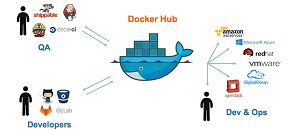News
Docker Updates Hub for Faster Response
The service already has more than 200,000 images.
One major reason for the explosion of containers is the need to scale up and out to the cloud. Of course, to do that, applications need to be able to similarly scale. That's why the leading container vendor is making it easier to do just that.
Docker has updated its Docker Hub cloud service designed to speed up application delivery by development teams through automated workflows.
Docker is widely recognized as the main player in the burgeoning application development container industry, which aims to simplify the development, shipping and running of applications. Basically, containers wrap up applications with all the software needed -- code, runtime, system tools and libraries and so on -- to guarantee they work the same regardless of the environment in which they run, on Linux, Mac OS or Windows.
The Docker Hub cloud service, launched last year, provides a registry for storing and sharing more than 200,000 Docker images, along with other services such as private repositories, automated builds and organizational collaboration tools.
The company yesterday announced an update to the hub that includes a re-architected stack and a new UI.
"Teams use Docker Hub's private repos, automated builds and webhooks to assemble tailored toolchains across their source code, and throughout their integrated build, test, registry and deployment environment," said exec Scott Johnston in a blog post yesterday. "And with built-in organizational collaboration tools, including fine-grained access control, teams can more easily use Docker Hub to share images and coordinate their work."
 [Click on image for larger view.]
Docker Hub (source: Docker Inc.)
[Click on image for larger view.]
Docker Hub (source: Docker Inc.)
In a news release, the company claimed users of the updated hub are seeing 2.5 times faster downloads and UI response times that are 1.9 times faster. With increasing popularity of container technology, the company said those downloads have grown to more than 860 million, requiring more than 200TB of storage and 400TB of network bandwidth, which resulted in the need for the re-architecture.
One company using the service is Couchbase, which provides a NoSQL distributed database platform.
"Docker's encapsulation and isolation benefits make it easy for Couchbase to package up build requirement into a single container, instantly spinning up new containers on demand to test proposed changes," Docker quoted Couchbase exec Tim Stephan as saying. "By integrating Docker Hub with Jenkins, we are able to accelerate and further automate our CI pipeline for testing new images, reducing the time required to build and test from days to minutes. With Docker, we are able to maintain a full inventory of current and historical images while being able to easily share the right images across our various build environments and development teams and ship any change."
Docker exec Marianna Tessel said the update should carry the hub into next year and promised further udpates as its community and content continue to grow.
About the Author
David Ramel is an editor and writer at Converge 360.